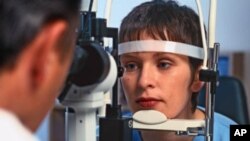Patients with a congenital eye disease that was gradually blinding them have received something they never thought possible - a partial return of their eyesight. Scientists were able to halt their progressive blindness and partially restore their vision in one of the first successful demonstrations of gene therapy.
Leber’s congenital amaurosis, or LCA, is a rare inherited disorder in which people are born severely visually impaired, and usually go blind by the time they're in their 30s or 40s.
LCA is one of a group of eye disorders in which defective genes interfere with the production of enzymes essential for light reception in the retina - the light sensitive tissue in the back of the eye.
“I really was pretty sure that I was just going to go blind, and that was a reality that I had to face. And I was struggling terribly with that," said Tami Morrison, 47, a social worker and mother of three children living in Ohio.
Three years ago, Morrison was one of a dozen patients with LCA who agreed to take part in an experimental gene therapy being conducted by medical researchers at the University of Pennsylvania and Children’s Hospital of Philadelphia. The scientists carefully injected each LCA patient's most diseased eye with a harmless cold virus containing a normal copy of the defective gene, called RPE65.
Within a few days, scientists began to notice an improvement in the patients’ light sensitivity. The improvements continued and lasted to the point where six of the patients could no longer be classified as legally blind.
Investigators confirmed the success of the gene therapy using neuroimaging. They could see an area of the brain responsible for vision "light up" in magnetic resonance imaging when a dimly flickering checkerboard pattern was flashed in front of the patients' eyes.
When it became clear that the improvement in eyesight would last, researchers led by ophthalmologist Jeanne Bennett at the University of Pennsylvania repeated the gene therapy in the untreated eye of three patients, who Bennett says became able to see better in dim light. Bennett says two of the patients were able to navigate an obstacle course in dim light following treatment.
“And so we’re very excited about the possibility of being able to deliver a corrected gene and correct the root of the problem in this disease, and have the correction persist over time,” she said.
Tami Morrison was the first patient in the study to receive gene therapy in the second eye.
While she can’t read a book or see clearly defined lines and shapes, Morrison says she can now see colors and her children’s smiling faces, and that’s good enough for her.
“It is absolutely remarkable," she said. "You don’t know how remarkable. It’s just changed my life tremendously and that of my family because I worried so much, you know, every day about going completely blind. Now I don’t have that fear anymore, and my whole world is completely different.”
Plans are now underway to complete the first trial and administer gene therapy to the second eyes of the remaining nine LCA participants in the first trial, including four young patients under 11 years of age.
An article by Jeanne Bennett and colleagues on the use of gene therapy to improve the vision of patients with Leber’s congenital aumaurosis is published in the journal Science Translational Medicine.
Scientists Use Gene Therapy to Restore Eyesight










